Easter
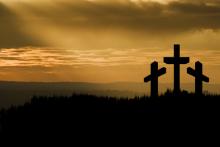
“Liturgical celebration is a re-entrance of the Church into the event, and this means not merely its ‘idea,’ but its living and concrete reality.”
—Fr. Alexander Schmemann
You and I bring our life experiences with us when we gather with other Christ followers for worship. Everything that has happened to us on our pilgrimage in this world accompanies us, in fact, wherever we go.
Our past is part of what makes us unique persons. What we have endured and felt and accomplished informs our conversations and often helps determines our actions in the present moment. This is what it means to be human.
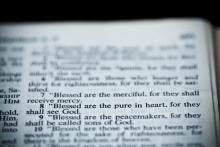
“Blessed are the peacemakers, for they will be called children of God.
“Blessed are those who are persecuted for righteousness’ sake, for theirs is the kingdom of heaven.
“Blessed are you when people revile you and persecute you and utter all kinds of evil against you falsely on my account. Rejoice and be glad, for your reward is great in heaven, for in the same way they persecuted the prophets who were before you.”
Social Justice Reflection:
Jesus was a peacemaking, blessed child of God, but he also was an “other.” Reviled and persecuted, he was the paperless son of displaced immigrant parents. The prophetic iconoclast. That guy who hung out with those people, the type most modern leaders would not associate with, except for a photo opportunity at a Thanksgiving Day soup kitchen. Let us remember on Sunday when we celebrate his resurrection, that Jesus was crucified because he was an outsider whose way of doing things scared and angered the powers-that-be.
We have become a nation that loves to “other” people. We point out their differences as reasons they cannot be trusted, as evidence that they take too much from the rest of us or threaten our well-being. We have lengthy, bitter debates about allegiance and legitimacy, and we reject those who do not meet our standards. We know who belongs, and the others need to clear out and leave us alone with our worldly possessions, our rules, and our way of doing things.
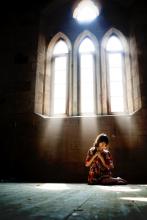
HOW SHALL WE engage with scripture through all 50 days of Easter? There are clues in the haunting story of Jesus' appearance beside the sea of Tiberius. After Easter Day many of us are ready to let things quickly revert to normal. It is, strangely, both reassuring and uncomfortable to hear that those disciples, whose business had been fishing, wanted to get back to their boats so promptly after the horrors and wonders they had witnessed in Jerusalem.
Jesus is waiting for them by the shore with breakfast already cooking. All is ready, yet he wants them to bring some of what they haul up in their nets, so he can include samples of their own catch in the menu. And what a catch it was!
Easter is our time to experience the grace that is always ahead of our game and is underway for us before we are ready. Yet grace does not exclude what we bring to the table. Grace expects and includes the work of our hands, the weavings of our imaginations, and the gifts of our unique experiences. In one sense, Eastertide is more truly a season of repentance than is Lent. One thing we might need to repent of is our passivity—those times when we expect God to hand us on a plate the meaning we are hungry for. We need to bring our own bits to the cooking fire if we are to really eat with Jesus. It is part of the mix of grace that we must participate, not just receive.

FROM THE RIVER to the rope. From the creek to the cross. From the dove and a "voice from above" to death by state execution and profound silence.
This is Lent. This is the Jesus Road, the Christian way. O Lord, how can we follow you?
Lent is time of remembering ourselves. In the ancient church, those preparing for baptism were publicly challenged: Do you renounce your bondage to Master Satan? Do you reject the slave-mind and all its glamour and subtle temptations? Will you allow Christ to buy your freedom?
The catechumen turned to face the east and the dawn, answering: "I give myself up to thee, O Christ, to be ruled by thy precepts."
It is Lent. We go down to the river to pray. We step into the waters of repentance. We surface as a new creature in Christ. From that moment onward, we imprint on Jesus. This is our survival strategy as newborn disciples. We follow him, like ducklings behind their mother.
After his baptism in the Jordan River, Jesus is driven straight out—into the unloved places, into the wilderness. There he is pricked by demons to toughen him up. He is being prepared. He must look into his own despair. Satan is the supreme surgeon for separating us from our hope.

IN THE EARLY weeks of the Eastertide lectionary, there appears a series of texts from the third and fourth chapters of Acts ... Peter and John, on their way to temple prayers, heal a man begging at the beautiful gate. His joy begets a sermon from Peter on the resurrection, at the close of which the disciples are arrested and spend the night in jail. The next day in court they again testify boldly, refuse to comply with the court's order, and are released after calculated threats from the authorities. Their release prompts prayers of thanksgiving in the community.

I RECENTLY FINISHED a new book, which we launch on April 1, the day after Easter. The beginning of the Easter season is a liturgically appropriate moment for the introduction of a hopeful book in what many feel is a hopeless time.
I wanted to tell you, our faithful magazine readers, why I wrote this book, and why I called it On God's Side: What Religion Forgets and Politics Hasn't Learned About Serving the Common Good.
This is not just another book for me. I wrote it during a three-month sabbatical that started in a monastery overlooking the Pacific Ocean. Every day started before sunrise with prayers, walks, yoga, and exercise, followed by writing the rest of the day. My other discipline was not to write or comment publicly on the news. I watched the nation's political discourse each night after a day of writing and found it more depressing than ever. It was an election year.
The resulting book is not about politics in the narrow sense, but about how to engage our personal and public lives with an ancient but timely idea and practice—the common good—that has long and deep historical roots across many religious faiths and secular notions of democracy. I sought to explore the biblical and theological roots of the idea, and then apply it to the most basic questions of economic trust, the role of government, civility, renewing democracy, globalization, conflict resolution in a violent world, and, of course, what our faith can contribute to the common good with the world as our parish. Most compelling, I found Jesus' call to love our neighbors to be the gospel foundation for serving the common good, and the excerpt in this issue, "A Gospel for the Common Good" (page 16), makes the case for that.
For Christians, the book explores a fundamental question: Why did Jesus come, and what do the gospel and the mission of the church really entail? The book's message is that when people of faith actually say and do the things their faith stands for, two things happen: at first other people are surprised, and then they are attracted. It examines both inspirations and practices for how we can respond to the growing hunger for a better life together and find common ground for the common good, especially in relation to those who are the most vulnerable.

“What? What happened?” My co-worker asked, sensing the solemn look on my face.
“Another patient died,” I reported. Grief and thick silence hang in the air as I thought back to the last time I saw this person, hospitalized, unable to speak, but for a brief moment our hands met in an embrace, and although he couldn’t speak, his demeanor and soft touch of the hand said it all.
I brought myself back to the present moment. It was the end of the work day and I strapped on my helmet to bike home, a Lenten commitment I’ve found to be incredibly rejuvenating.
I pedal past the housing projects and turn the corner around the city jail. Activists holding bright colored placards protest peacefully against the death penalty. I smile at them. “Keep up the good work!” I enthuse, giving them a thumbs up from my navy blue mitten and pedal on my way.
A second later, it hits me. Tears rush to my eyes but refuse to come out. The taut muscles in my throat contract; that familiar lump in which no words can come out, just expressions of the heart. Yes, it hit me.The juxtaposition and irony of it all. Life and death. One man died today from four letters that no one should ever have to die from, but globally, some 1.8 million do every year. Another man protested for the life of another to not be cut short before the redemption and healing and forgiveness began.
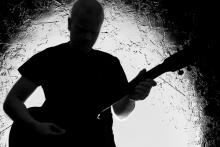
More than once I’ve been referred to as a modern-day Troubadour. I’ve always liked this designation because it has a romantic, archaic ring to it that sounds just a little bit more flattering than mere singer/songwriter, naturally appealing to my vanity. But it once occurred to me that I wasn’t entirely sure of its meaning and thought I should look it up.
Not surprisingly, I discovered the word to have various historical uses and nuances. But the definition that intrigued me most, and which I recognize as fairly accurate of my own sense of calling and vocation is this:
Troubadour:
a lyric poet sent by one (usually of the King’s court)
with a message of chaste love to another.
Well … there you go. Just two weeks ago (on Valentines Day) I posted a song and message of chaste love in a blog. In it, I celebrated 30 years of marriage to my wife Nanci; a union that has resulted in three beloved (now adult) children, their own unions to beloved others, two grandchildren, and a deeply meaningful, long-term foster relationship with a young woman and her beautiful children who, in fact, are coming over for dinner tonight. I can’t wait.
Although not every chaste union strives to produce offspring, Fr. Gabrielle of St. Magdalen, in his meditative devotional Divine Intimacy, teaches that the highest glory of the chaste union is in it’s potential to become a willing “collaborator with God in the transmission of life.” That is: a relationship that is materially fecund; suggesting a dark, loamy richness capable of concealing and safeguarding a vulnerable seed, and providing a nutrient-rich soil from which it can spring to it’s own leafy uniqueness. It’s a lovely image.
Ironically, what struck me this morning is that Valentines Day is celebrated at the very onset of the season of Lent. And Lent, in contradistinction to Valentines, is essentially a season where the Christian “faithful” penitently consider the devastating disaster that is infidelity — particularly, infidelity to God, and by extension, to all that God is in faithful relationship to.

Use this Lenten season as a time to grow closer to God and simplify your life. Try a new suggestion from this list each day and experience the stronger relationships and calmer pace of an (almost) Amish lifestyle!
1. Start a giveaway box and add at least three items of clothes you have not worn in the last year.
2. Is there a form of technology that is ruling you like a master rather than serving you like a tool? Unplug for 24 hours and rediscover the peace that passes all understanding.

A day of darkness and gloom, a day of clouds and thick darkness!
-Joel 2:2
Who in their right mind looks forward to Lent? Seven weeks of preparation to lead up to Good Friday hardly seems like an enjoyable way to spend our time.
Why not work on those New Year’s resolutions that have already been slipping instead? How about some more quality time with the family? What good, after all, can come from dwelling on darkness and death for more than forty days?
How about we all just agree to skip Lent this year and just get back together on Easter, okay?
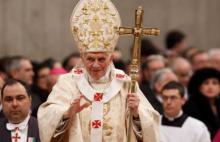
VATICAN CITY — In a move that took the world by surprise, Pope Benedict XVI announced on Monday that he will become the first pope in 600 years to resign, with plans to step down on Feb. 28.
“After having repeatedly examined my conscience before God, I have come to the certainty that my strengths, due to an advanced age, are no longer suited to an adequate exercise of the Petrine ministry,” Benedict told cardinals as they gathered in Rome for the proclamation of new saints.
Vatican spokesman Rev. Federico Lombardi said preparations for the conclave that will elect Benedict’s successor are in the early stages.
A papal election could be expected “within 10 to 15 days,” he said. “We should have a new pope by Easter.”
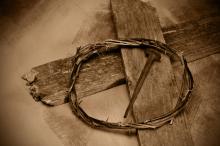
“We know love by this, that he laid down his life for us--and we ought to lay down our lives for one another. How does God's love abide in anyone who has the world's goods and sees a brother or sister in need and yet refuses help? Little children, let us love, not in word or speech, but in truth and action.”
On April 29th, many churches will be hearing this reading from I John 3:16-24 as the Epistle Lesson for the Revised Common Lectionary for the Fourth Sunday of Easter/Year B. Here is a new hymn inspired by this biblical teaching for compassion.

In a video address Tuesday, President Obama told hundreds of young evangelical Christian leaders gathered at the Q Conference in Washington, D.C., that they had a partner in the White House in their humanitarian and social justice efforts.

I didn’t see Tim Tebow’s Easter Sunday appearance in Texas. For one, it’s in Texas and I’m not. Plus I kind of have a standing gig on Sundays. But more than that, I was irked when I heard about the big event being planned on, of all days, Easter Sunday.
For the most part, I admire Tim Tebow, even though I don’t agree with him theologically very much. He made one statement about getting back to what this country was founded on, “One Nation, Under God,’ which seriously rubbed me the wrong way (HINT: the phrase “Under God” wasn’t added to the Pledge of Allegiance until the 1950s.), but for the most part, he was the upstanding Christian athlete people have come to expect.
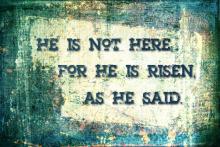
Yesterday the Lord Awoke.
You see, God had been sleeping. Entombed again. How long, O Lord, must we sing this song of You Entombed? We bury you again and again. We crucify you again and again. Then, when you show us (again and again) that death cannot contain you, we run away. We're afraid. We cannot imagine a world in which Death has no sting. We cannot imagine a world in which Death does not hold the last word and our ability to deal in Death doesn't empower us.
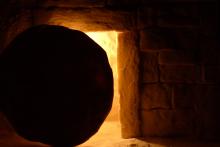
The Gospel of St. Matthew, Chapter 28 tells us:
The angel spoke to the women: "There is nothing to fear here. I know you're looking for Jesus, the One they nailed to the cross. He is not here. He was raised, just as he said. Come and look at the place where he was placed.
"Now, get on your way quickly and tell his disciples, 'He is risen from the dead. He is going on ahead of you to Galilee. You will see him there.' That's the message."
To listen to a playlist of music for this Resurrection Day 2012, CLICK HERE.

Poetry is language made material.
It presents us with objects and the world, yes, that is part of its materiality, but it also – and perhaps fundamentally – makes our very language into a thing, rather than simply a medium. Like remembering that you exist in time, and becoming aware of your temporality, poetry takes what we are always immersed in and says, Remember; become aware.
Thus it is like all art a meditative practice. You must slow down, quiet yourself, and actively receive – a strange gesture, perhaps paradoxical, but one that is, if nothing else, prayer. And so for Holy Week, I want to present four (mostly) contemporary poems that can direct meditation without limiting it, that can engage prayer in our physical existence and the existence of the Resurrection as event, that can slow one down, that can build sensual memory of the acts we do and life we live in constant remembrance of it, of Him.
In his weeky address, President Obama said in part:
"For millions of Americans, this weekend is a time to celebrate redemption at God’s hand. Tonight, Jews will gather for a second Seder, where they will retell the story of the Exodus. And tomorrow, my family will join Christians around the world as we thank God for the all-important gift of grace through the resurrection of His son, and experience the wonder of Easter morning.
"These holidays have their roots in miracles that took place thousands of years ago. They connect us to our past and give us strength as we face the future. And they remind us of the common thread of humanity that connects us all.
"For me, and for countless other Christians, Easter weekend is a time to reflect and rejoice...."
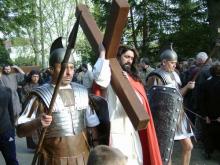
I’ve never liked the fact that we call the day on which we remember Jesus’ crucifixion “Good Friday.” What’s so good about it anyway? Personally I find the entirety of Holy Week – save for Easter – pretty depressing. Sure, the days are getting longer and things have started to grow all around us, but until Easter, the focus of the week is the suffering and death of an innocent man.
It turns out that, although plenty of folks have their own explanations, nobody actually knows why we call it Good Friday. I think the Germans are spot-on by calling it Karfreitag, which means “Suffering Friday.”
Figures the Germans would be more content to sit with suffering than the rest of us. They’re so serious! But I digress…
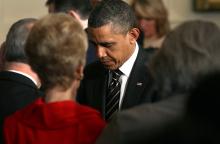
President Obama hosted his third annual Easter prayer breakfast for about 150 members of the clergy from across the nation in the East Room of the White House Wednesday morning. In his six-minute address, Obama reflected on the spiritual messages of Easter -- Jesus' triumphant overcoming of his own human doubts and fears so that all of humanity might do the same.
"For like us, Jesus knew doubt," Obama said. "Like us, Jesus knew fear. In the garden of Gethsemane, with attackers closing in around him, Jesus told His disciples, 'My soul is overwhelmed with sorrow to the point of death.' He fell to his knees, pleading with His Father, saying, “If it is possible, may this cup be taken from me.” And yet, in the end, He confronted His fear with words of humble surrender, saying, “If it is not possible for this cup to be taken away unless I drink it, may your will be done.”
"So it is only because Jesus conquered His own anguish, conquered His fear, that we’re able to celebrate the resurrection. It’s only because He endured unimaginable pain that wracked His body and bore the sins of the world that He burdened -- that burdened His soul that we are able to proclaim, 'He is Risen!'"